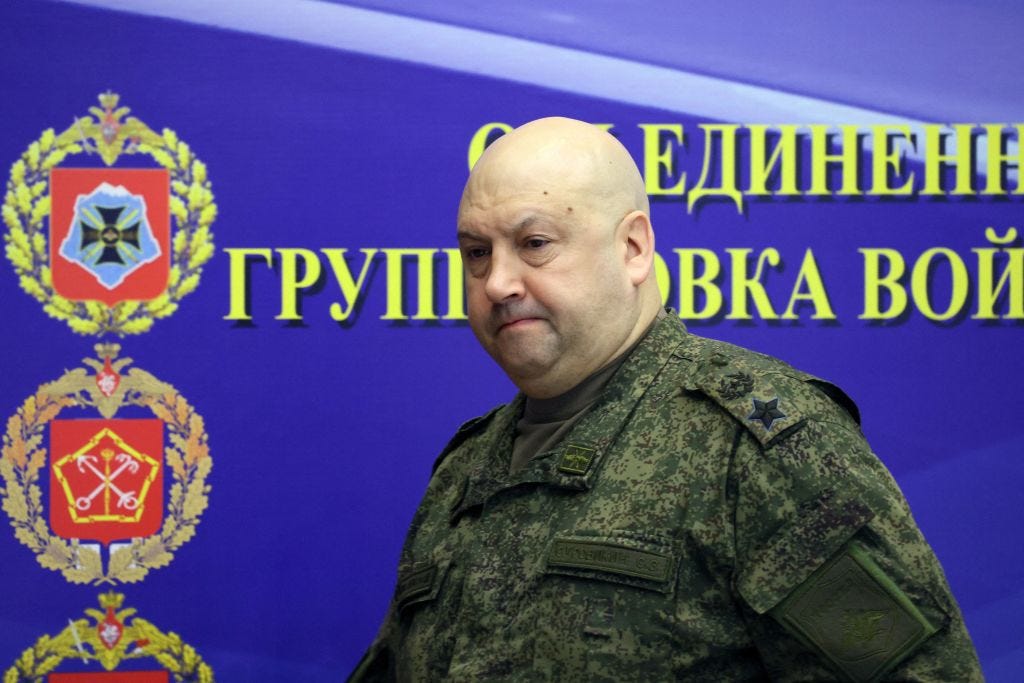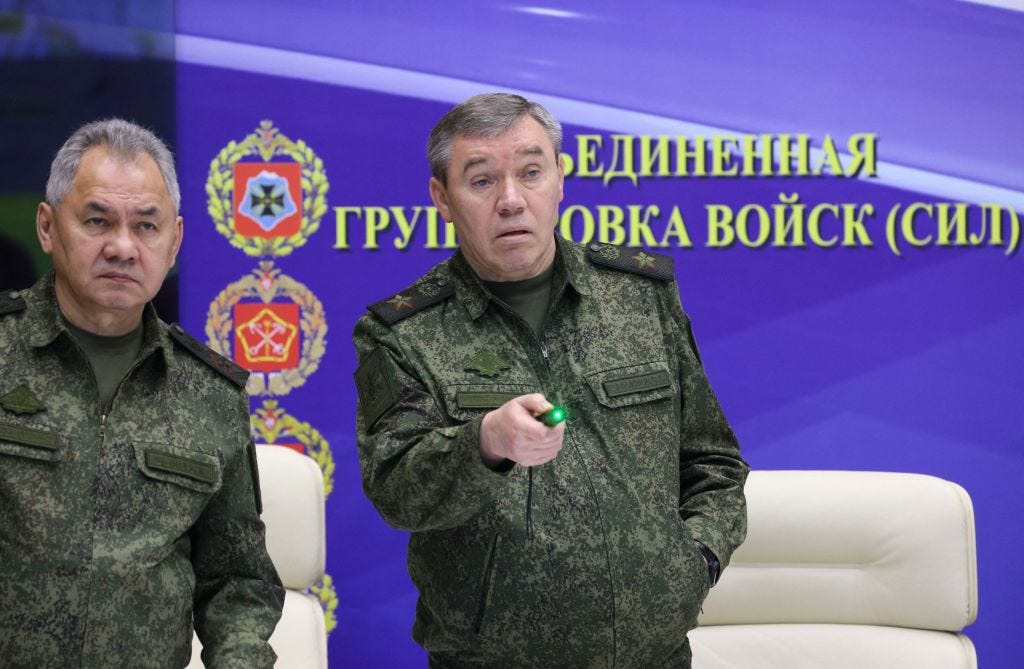Russian military reshuffle: all change or business as usual?
The return of General Gerasimov as the commander of Russia's war in Ukraine sends many signals. Let's try to decipher them.

In a widely commented military reshuffle, General Sergei “Armageddon” Surovikin, has been replaced as the commander of Russia’s war in Ukraine, by his much-criticized boss, chief of staff Valery Gerasimov. BBC Russian asks what the move means and whether it will make any difference.
The announcement of changes in command of the ‘special operation’ in Ukraine came in a statement from the Defence Ministry on 11 January.
“The enhancement of the special operation’s leadership is linked with the increasing scale of tasks to be dealt with, and the need to ensure closer coordination between different units of the forces,” the statement said.
In addition to making Chief of Staff Valery Gerasimov the new commander of the Joint Group of Forces in Ukraine, the reshuffle moved the previous commander, Sergei Surovikin, who had been in the role for less than three months, to become one of three deputies. It created two further deputy positions for Oleg Salyukov, commander of Ground troops, and Alexei Kim, deputy chief of staff.
The move came as heavy fighting continued between Russian and Ukrainian forces for the salt-mining town of Soledar – in eastern Ukraine. On 13 February Russia claimed to have taken control of the town, although at the time of publication this is still disputed by Ukraine.
For Moscow capturing Soledar would be a morale boost for the Russian army after a string of significant losses in recent months. Military leaders have come under heavy criticism inside Russia from supporters of the war, after the retreats from both Kharkiv region, and the city of Kherson. Much of their anger has been directed at General Gerasimov.
At the end of last year, analysts from the American Institute for the Study of War (ISW) noted that the Kremlin had kept Gerasimov out of the public eye for almost 10 months. As the war approaches its second year, the ISW suggested that the Kremlin was now preparing to bring him back into the limelight in order to take responsibility for the next stage of the operation. In January, the ISW predicted Russia was planning a renewed and decisive military offensive in 2023, and that Gerasimov’s appointment was a part of this strategy.
On the 18 December, during the first officially-announced visit to the military headquarters in 10 months, TV channels showed President Vladimir Putin in conversation with Shoigu, Gerasimov and Surovikin. At the end of December, the Chief of Staff - also for the first time after a long break - appeared on screen to speak independently to military attachés from other countries.
The popular general and “difficult decisions”
Sergei Surovikin was appointed Commander of the Joint Group of Forces in October 2022, shortly after Russian troops surrendered the city of Lyman.
His appointment was hailed by critics of the Ministry of Defence including most notably – Yevgeny Prigozhin, head of the Wagner Group, and Chechen leader, Ramzan Kadyrov. Kadyrov called Surovikin, “a real warrior”, and Prigozhin called him, “a legendary figure”.

Ten days after his appointment, Surovikin became the first Russian military leader since the beginning of the war to be shown on television by the authorities.
During the statement, broadcast by the “Russia 24” TV channel, Surovikin predicted, among other things, “difficult decisions” with regards to Kherson. Within a month, the Russian army had surrendered the city.
One version of events would say that Surovikin was appointed out of a desire from the Kremlin to transfer the responsibility onto him for the withdrawal of troops from Kherson, the only major city that Russia had successfully captured during the war.
Eventually, it was Sergei Shoigu who formally decided to retreat after Surovikin’s report. Putin made no comment.
Experts from the ISW have noted that even giving up Kherson did no damage to Surovikin’s reputation among supporters of the war. On the 31 December, TASS reported that President Vladimir Putin had presented him with the Order of St. George third class.
The day before the reshuffle was announced, news broke of another change of command of Russian forces in Ukraine. Lieutenant-General Aleksandr Lapin, who has also been heavily criticised for military mistakes, was given the title of Chief of the Ground Forces’ Headquarters, as announced in the media. It was Lapin who Kadyrov, Prigozhin and other pro-war bloggers held responsible for the Russian army’s lack of success at the front, – including the retreat from Lyman.
According to Russian political scientist Abbas Gallyamov, this role change is indicative of how “Putin made a point of ignoring the opinion of players from outside of military establishment, like Prigozhin and Kadyrov, and took the side of his officials”. Political scientist Yekaterina Shulman agrees, saying the changes suggested a bureaucratic victory for Minister of Defence Sergei Shoigu.
BBC Russian correspondent Ilya Abishev gives his take on the reshuffle:
“Valery Gerasimov has been neither demoted nor promoted to his new role. At the end of the day, the post of Chief of Staff is still there for him. There’s no need to discuss the changes in responsibility - even without this job title, Gerasimov was already responsible for all things combat in Ukraine.

General Surovikin’s move from commanding the joint group of Russian forces in Ukraine to now being a deputy doesn’t look like a significant demotion either - Gerasimov was always his immediate superior and he will remain so. The role is quite a shaky one anyway - it exists today, but it might not tomorrow.
There’s another aspect that’s more important. It’s safe to say that the decision about these new appointments was taken by President Putin, rather than Gerasimov’s official boss who himself has no military background at all: the Minister of Defence, Shoigu.
What this means is that even though multiple heavy losses for the Russian army in the Kharkiv, Donetsk and Kherson regions led to Gerasimov and Surovikin being accused by many ‘Z-patriots’ of borderline treason, Putin still chooses to hedge his bets on these old, as he sees them, tried and tested personnel.
It’s also worth considering here another promotion announced yesterday, which was that of General Lapin to the post of Chief of the Ground Forces’ Headquarters. Yevgeny Prigozhin, founder of the “Wagner Group”, has called him talentless, and Ramzan Kadyrov, head of Chechnya, demanded he be demoted to the rank of private.
Kadyrov and Prigozhin’s influence as leading critics of Russia’s Ministry of Defence, it would seem, only grew with every time the Russian forces missed the mark for the umpteenth time. Since the beginning of the war in Ukraine, Kadyrov rose from Major-General to Lieutenant-General, and Prigozhin was given unbelievable free-rein; he was asked to recruit tens of thousands of prisoners and thrust them into the heat of battle, including some convicted of serious violent crimes, in exchange for a guaranteed pardon for their crimes (which only the President has the right to grant).
Even hardened employees of Russia’s Federal Penitentiary Service were taken aback, and the unexpected reinforcement of Prigozhin’s position significantly concerned leaders in the security forces as well as others with direct access to Putin.
Looking at the newly-appointed Gerasimov today, one can make two observations; Prigozhin, in spite of his best efforts, has not managed to prove the special effectiveness of his “Wagner Group” and guarantee himself a victory in the covert bureaucratic games. On the other hand, Putin only has one deck of cards, and he has no intention of playing with any others.”
Read this story in Russian here.
Translated by Elsa Haughton.



